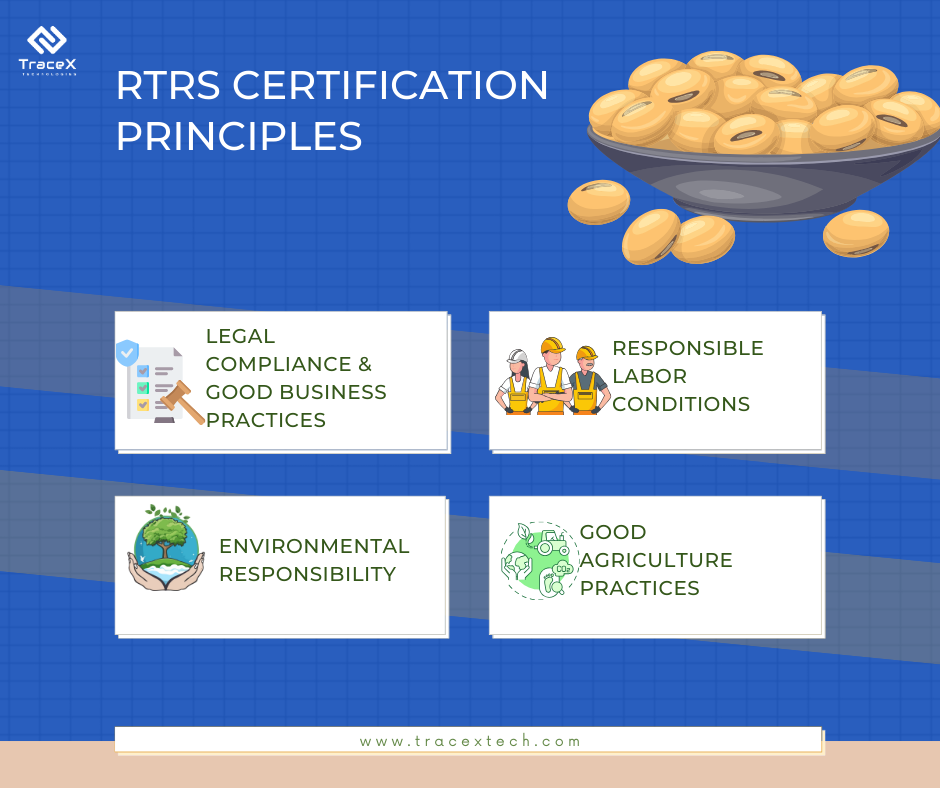Contact: +91 99725 24322 |
Menu
Menu
Quick summary: Unlock the intricacies of RTRS certification in soy production with our comprehensive guide. Delve into the world of sustainable agriculture and learn how RTRS certification is shaping the future of soy farming.

Round Table on Responsible Soy (RTRS) Certification plays a pivotal role in ensuring that soy production meets stringent standards for sustainability, encompassing factors like environmental conservation, social welfare, and ethical practices. As the demand for soy products continues to rise globally, understanding the principles and processes behind RTRS Certification is crucial for stakeholders across the soy supply chain.
Soybeans, small leguminous wonders, hold immense significance in agricultural landscape. Originating from East Asia, soybeans have transcended their humble beginnings to become one of the most widely cultivated and versatile crops globally.
In the food industry, soybeans are processed into various products, including soy milk, tofu, tempeh, and edamame, providing nutritious alternatives for individuals with dietary restrictions and preferences. Soy protein isolates and concentrates serve as key ingredients in meat substitutes, dairy alternatives, and protein supplements, catering to the growing demand for plant-based foods. Furthermore, soybean oil is a staple in cooking, baking, and food processing, valued for its neutral flavour, high smoke point, and heart-healthy properties.
However, the exponential growth of soybean cultivation has brought about significant environmental and social challenges, particularly in regions with extensive production. Deforestation, habitat destruction, soil degradation, water pollution, and greenhouse gas emissions are among the adverse impacts associated with conventional soybean farming practices. Moreover, issues related to land tenure, labour rights, and indigenous rights have sparked controversies and conflicts in soy-producing regions, raising concerns among consumers, investors, and policymakers alike.
In response to these challenges, the Round Table on Responsible Soy (RTRS) emerged as a pioneering initiative to promote sustainability and responsibility in the soy industry. Established in 2006, RTRS brings together stakeholders from across the soy supply chain, including producers, traders, processors, retailers, NGOs, and civil society organizations, to develop and implement standards for responsible soy production and sourcing. RTRS certification serves as a voluntary mechanism to verify compliance with these standards, ensuring that soybeans are grown and processed in an environmentally sound, socially responsible, and economically viable manner.
Dive into the intricacies of responsible sourcing, deforestation-free practices, and how innovative supply chain solutions are shaping a greener future.
Discover about sustainable soy production
RTRS certification serves as a voluntary mechanism for soy producers, traders, and consumers to ensure that soybeans are grown and processed in a responsible and sustainable manner. It sets forth comprehensive standards encompassing environmental conservation, social responsibility, and legal compliance. RTRS certification covers various stages of the soy production process, from cultivation and harvesting to transportation and processing, fostering transparency and accountability across the supply chain.

Explore innovative solutions and sustainable practices transforming the agricultural industry.
Discover how responsible agriculture supply chains are shaping the future of food production.
Technology solutions can play a crucial role in enhancing compliance with RTRS (Round Table on Responsible Soy) certifications by providing robust tools for monitoring, tracking, and reporting throughout the soy supply chain. Here’s how technology can address compliance:
By harnessing the capabilities of technology solutions tailored to the requirements of RTRS certifications, companies can strengthen their commitment to responsible soy production, enhance transparency across the supply chain, and demonstrate compliance with sustainability standards.
TraceX blockchain traceability solutions offer comprehensive tools to address compliance with RTRS certifications in soy production. By leveraging blockchain technology, TraceX ensures transparent and immutable tracking of soybeans throughout the supply chain, enabling stakeholders to verify adherence to RTRS standards at every stage. Through the traceability solution, companies can monitor the origin of soybeans, assess their cultivation practices, and confirm compliance with sustainability criteria. Real-time data collection and analysis empower companies to proactively identify and address non-compliance issues, mitigating risks associated with RTRS certification. Additionally, the certification management platform streamlines the certification process, facilitating documentation, audits, and communication with certifying bodies. With TraceX blockchain traceability solutions, companies can demonstrate their commitment to responsible soy production, build trust with consumers, and contribute to sustainable agricultural practices.
Despite challenges, RTRS certification continues to play a pivotal role in promoting sustainability in the soy industry. As awareness of environmental and social issues grows, demand for responsibly sourced soy is expected to increase, driving further adoption of RTRS standards. Collaboration among stakeholders, including producers, traders, governments, and civil society, is essential to advance sustainable soy production and achieve broader impact.
The journey through the realm of RTRS certification in soy unveils a path towards a more sustainable and equitable future. As we navigate the complexities of modern agriculture, it becomes increasingly evident that responsible sourcing is not merely an option but a necessity. Soybeans, with their ubiquitous presence in our lives, present both opportunities and challenges, reflecting the intricate interplay between human needs and planetary health.
RTRS certification stands as a hope amidst these challenges, offering a framework for positive change in the soy industry. By adhering to rigorous standards encompassing environmental conservation, social responsibility, and legal compliance, certified producers pave the way for a more resilient and inclusive agricultural sector. Their commitment to sustainable practices not only mitigates environmental degradation and safeguards biodiversity but also upholds the rights and well-being of communities dependent on soy production.
As consumers, investors, and advocates, we hold the power to drive demand for responsibly sourced soy and catalyze transformative change throughout the supply chain. By choosing RTRS-certified products and supporting companies committed to sustainability, we send a clear message that ethical considerations must be paramount in our purchasing decisions. Moreover, by engaging with policymakers, industry leaders, and civil society, we can advocate for policies and practices that promote transparency, accountability, and collaboration across sectors.
The road ahead may present challenges, but it also brims with opportunities for innovation, collaboration, and positive impact. Through collective action and unwavering commitment, we can build a future where soy production harmonizes with environmental conservation, social justice, and economic prosperity. Let us embrace the principles of RTRS certification not only as a means to sustainably source soy but as a guiding light towards a more just and sustainable world for generations to come. Together, we can cultivate a brighter future — one soybean at a time.
